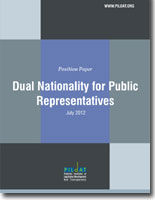Dual nationality of public representatives and officials has recently become a matter of concern in Pakistan; it has been opined that dual citizenship implies divided loyalties and thus those individuals who adopt nationalities other than Pakistani should not be allowed to contest elections and represent the people of Pakistan. Although clear Constitutional provisions exist that if a Pakistani national acquires the citizenship of another country, he or she can not be elected, or remain a member of the Parliament, its implementation has been hazy. The Pakistan Citizenship Act 1951, the Representation of People Act 1976, detail relevant measures in this regard, barring dual citizenship and also to contest in the General Elections. Our neighbouring India, with similar legal history, does not recognize dual citizenship and the provision for an alternative form of Indian nationality, the holders of which are knows as Overseas Citizens of India (OCI) get neither voting rights, nor eligibility to contest elections of Lok Sabha or take up any Government post. This paper by PILDAT discusses the constitutional and legal position of Pakistan on this issue and also provides a comparative analysis with countries such as the UK and India alongwith others. It also discusses the international legal paradigm and provides a foundation for a legislative and political discourse.







